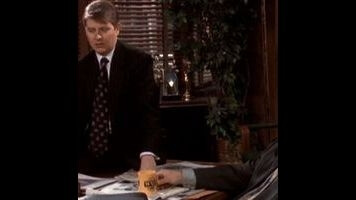NewsRadio: "Daydream" and "Movie Star"

Today's pair of episodes raises an interesting question: What is NewsRadio's attitude toward television? Where does it believe that it fits, and how is it trying to reshape the mold of television to create its own unique niche?
"Daydream" is perhaps the first episode of the series to venture tentatively into the fantasyland that the show would come to occupy regularly during its last season, and it ends with a reference to one of the two most famous fantasy twists in the history of televised drama.* And "Movie Star" (despite the title — well, maybe including the title) is all about television — what it's for, why we might like it, whether our addition to it is physiological or psychological.
"Daydream" is high-concept all the way: We see the content of the daydreams of each member of the staff before they are snapped out of it by the mundane reality of the newsroom. Out in the real world, drive-time ratings are in the toilet, and Mr. James has decreed that Fone Bone's Follies, a cavalcade of comedy and big band music from the good ol' days of radio, will be airing in place of news and weather. (This leads to a explosively funny staff meeting scene, paced exactly like something from old time radio, actually, in which no one hears Dave's repeated announcements of the change. "Well, as long as our ratings are good … Dave, if you're going to change the drive-time schedule, you really ought to clear it with Mr. James … Can we wrap this up because it's almost drive-time and unless someone's changed the schedule I've got to do the news and weather.")
So Bill dreams of sweeping all the women in the office off their feet, one by one; Lisa dreams of delivering the perfect comeback to Dave's maxim "when the big man comes at the small man with all his force, it is the wise small man who steps aside"; Joe dreams of having a remote that controls everyone in the office; Catherine dreams that she's not the only person of color in the office; Beth has day-mares that Matthew is a horror-movie serial killer; and poor Howie, the snack cart guy, dreams that somebody cares about him. ("We'll see you tomorrow, okay, Harry?" Dave dismisses him, crushingly.) And Dave? Well, Dave fantasizes that everyone has great ideas for how to improve the drive-time ratings. As somebody's boss, I can completely identify with that. (Matthew does have one idea, contributed on a crumpled napkin: "Get better ratings.")
In the epilogue, the whole thing goes completely meta when Dave comes home to Lisa and finds Mr. James staring into a snowglobe with a miniature version of their building. It's the St. Elsewhere capper, where the entire series was revealed to be the dreamlife of an autistic child. Is television our snowglobe, as it were? Why do we care so much about these fictional people, anyway? The question continues to dominate "Movie Star," in which the B-story concerns Dave's efforts to hook Lisa on the plug-in drug. (The first one's always free, you know.) She mocks his devotion to television by boasting that she's read Anna Karenina multiple times; "I missed a whole semester's worth of Cheers reading Anna Karenina," complains Dave. But when Lisa sees CSPAN2 — round the clock coverage of the Senate — she does a 180. The episode ends with them sitting together in front of a bank of televisions, Dave watching Green Acres, Lisa watching CSPAN, their eyelines crossing without complaint when the shows switch sides.
NewsRadio = Green Acres? I know something about the wave of rural comedy of which Green Acres was a part, I've watched it occasionally, but I'm not, as Mr. James would say, "kind of a superfan." What's the connection? And why does it annoy Dave — annoy any of us who immerse ourselves in pop culture — when someone refuses to participate in the mass media on the grounds of intellectual superiority?
By way of contrast, Bill's life has been validated because movie star James Caan is shadowing him while doing research for a role. It's his chance for self-aggrandizement — "What makes a guy like me tick? Where to start, where to start …" — but Caan only wants to know about behavioral details like how Bill wears his headphones, not about his psychology. He can't ignore the psychological puzzle that is Matthew, though, and soon he's ignoring Bill altogether in order to watch Matthew trying to floss his teeth or use the coffee machine. "Guy's gotta be the strangest sonofabitch I ever saw … You see somebody like that, you just gotta wonder: what makes this guy tick?" By the end of the episode, Bill is reduced to demonstrating headphone usage to get Caan's attention: "Jimmy, I'm going in the booth now, use the cans …"
Caan fits so perfectly into the NewsRadio dynamic that it's easy to forget that he's a very special guest star. He can mold himself to the smaller box, the ensemble vibe, the amped-up energy (which he defuses brilliantly with his underplaying). It's television, and it's absolutely unforgettable — not because Caan elevates the show, but because the show transforms him. With these two episodes, we see NewsRadio reveling in its genre — a situation comedy, a half-hour of television — and stretching outside of that genre's comfort zone. There's an unmistakeable sense that the cast and crew are defending television as a medium capable of being deeply meaningful to us, sometimes in ways that make little sense outside of the media bubble but are real nonetheless, and at the same time taking the freedom they've been afforded and running with it, making entertainment that doesn't exactly conform to the established rules.
And isn't it glorious?
 Keep scrolling for more great stories.
Keep scrolling for more great stories.
